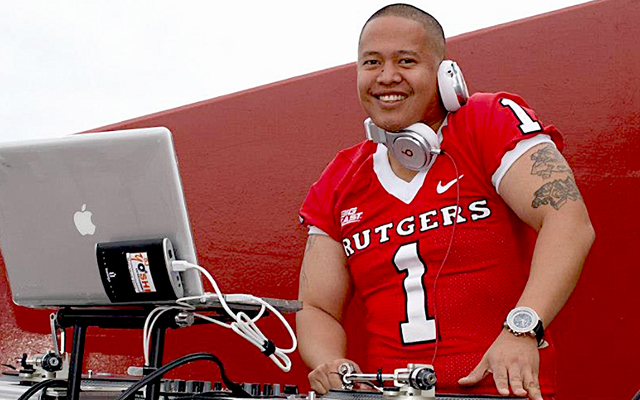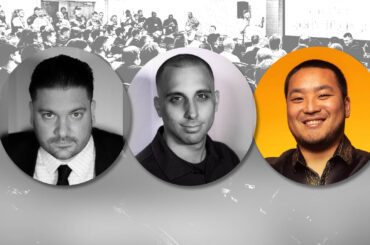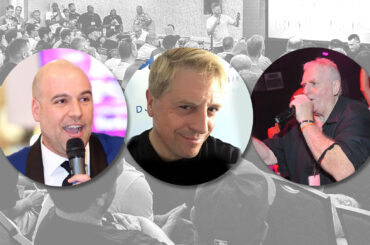“Spinning a sporting event is like scoring a movie,” says the New Jersey-based DJ Yoshi. “We’re in the business of creating experiences.”
DJ Yoshi (aka Eric De Torres) knows of what he speaks. For the last decade, he’s been spinning at college football (Rutgers) and professional basketball (New Jersey Nets) games, and recently became the first DJ to spin in-game at a major conference championship, in front of 60,000 people at Lucas Oil Stadium in Indianapolis for Big Ten football Championship Weekend.
“Since there has never been a DJ at a conference championship game in college sports before, I wanted to make sure that I was on point,” says Yoshi, who works full-time as a hospital administrator when he’s not spinning. “To make it a successful interpretation, there was a ton of research and collaborative work that was done.”
That weekend, Yoshi, an expert beat juggler, worked with Drew Robinson, the assistant athletic director of marketing and fan experience from Rutgers, who served as field spotter, stadium communicator and production person. “We were in constant contact with one of the Big Ten officials to make sure that we had the song list from each of the schools,” says Yoshi, himself a Rutgers grad. “From there, I did market research on Wisconsin and Ohio State [the game’s participants]. I DVR’d a few games from each of the schools on the Big Ten Network replays to hear what they were playing at their schools. Since Drew travels to each of the venues with Rutgers football, he was able to fill me in on what other programs were doing and playing and how they presented their in-game piece. We spent hours each day contacting labels for squeaky clean edits, making my own blends and then it hit us: Let’s look at the biggest songs outside of hip hop and dance to do remixes for.”
The Big Ten also made the day interactive by creating the Twitter hashtag #FCGDJ for Yoshi to utilize during the game. Thousands of tweets for song from fans flooded in, and Yoshi took the best requests and programmed them into the portions where they fit.
Since that game, Yoshi has been contacted by a few corporate entities and sports organizations that have inquired about his services.
“When you’re at a club, you pretty much know what the hits are to play,” says Yoshi. “It’s easy to kill a two-hour set at a club. When it comes to spinning a sporting event, you have to know the crowd, cater to the players on the field, and build excitement.
“I’ve been fortunate enough to travel around to other stadiums and arenas to hear how other DJs or in-game sound producers work their crowds. I take notes for what works and what doesn’t. I study a crowd’s reaction to certain points of the songs. There’s also a finite amount of time that you have as a DJ to get your point across with the music that you’re playing.”
To incite chaos and defensive chants, says Yoshi, “You wouldn’t drop a Calvin [Harris] track. You’d start the bass line or loop the chant from ‘Seven Nation Army.’ On big hits and first downs, an in-game person needs to know what to play, how to play, and be able to view the game and understand the flow. The most difficult part about sports is the pace of the game, knowing what’s coming next, and having a spotter to see what the officials are doing. There are also stadium and league rules that differ from the college game to the NFL. Certain songs are banned from stadium play.”
Yoshi says that keeping up with all of this while following a game script, pages long with PSAs, and scoring music for the PSAs, even though they can change on the fly depending on what the network is doing, is much tougher than just being in a club.
The programming also changes from sport to sport, as the speeds of the games and the layouts are completely different. “Basketball games for college are much different than an NBA game,” says Yoshi. “There are certain things that you can and can’t do at a college game, music-wise, that you can with the NBA. In college, it’s band-heavy. Basketball, there’s tons of time to drop samples for crowd chants and cheers. Football, you really have a few seconds before the huddle takes place after big plays. The PSA structure is completely different from basketball to football. When programming either game, we break it all down into categories.”
The categories include:
Ingress: Light and fun.
Warm-Ups: Hip hop, a few rock cuts, trap remixes, etc.
Pre-tip or Pre-kick: Build the energy.
In-game: Inspiring music for how the game is trending.
Big plays: Exciting music.
Timeout: Depends on the PSA or segment.
Post-game/Egress: Depends on the outcome of the game.
“Those are the folders that I have lined up in Serato,” says Yoshi. “I also have the Billboard chart-toppers that will work when there’s an ‘entertainment-factor’ portion of the game. For warm-ups, I’ll normally turn to the players or the director of player personnel for the team so I can play what the team wants to hear. Other than that, I’ve built a library of sounds, samples, and music that will work for no matter what the situation is.”
Yoshi has so successfully integrated the DJ into football game presentations that other programs have contacted him to see how it’s done. We asked if he’d ever consider DJing full-time. “I’m at a job that I love and it helps to keep me grounded and calm from the DJing life,” says Yoshi, who was a couch-surfing, hotel-hopping touring DJ back in the day. “I get to step into my role as a DJ when I’m away from that office as an outlet. It’s really turned it into both being fun for me. I feel alive again when I’m spinning because I’m not bogged down with the worries of making X amount to not just survive, but to thrive.”







